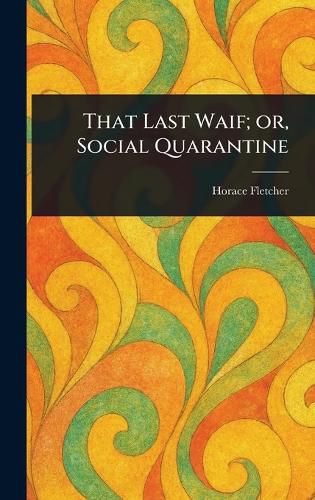Readings Newsletter
Become a Readings Member to make your shopping experience even easier.
Sign in or sign up for free!
You’re not far away from qualifying for FREE standard shipping within Australia
You’ve qualified for FREE standard shipping within Australia
The cart is loading…






This title is printed to order. This book may have been self-published. If so, we cannot guarantee the quality of the content. In the main most books will have gone through the editing process however some may not. We therefore suggest that you be aware of this before ordering this book. If in doubt check either the author or publisher’s details as we are unable to accept any returns unless they are faulty. Please contact us if you have any questions.
Horace Fletcher's "That Last Waif, or Social Quarantine" offers a compelling look into the landscape of child welfare and social reform. Delving into the pressing issues surrounding poverty, orphans, and childcare, this work examines the critical need for effective social work and support systems. Focused on child welfare, the book explores the complexities of adoption and fostering, presenting a historical perspective on the challenges faced by vulnerable children. Fletcher's insights shed light on the social issues of his time, particularly the impact of poverty and homelessness on families and children. This meticulously prepared print edition provides a valuable resource for anyone interested in the history of social sciences, offering a timeless exploration of enduring societal concerns. A significant contribution to the understanding of historical approaches to child welfare, "That Last Waif" remains relevant for those studying the evolution of social work and the ongoing quest for meaningful social reform.
This work has been selected by scholars as being culturally important, and is part of the knowledge base of civilization as we know it.
This work is in the public domain in the United States of America, and possibly other nations. Within the United States, you may freely copy and distribute this work, as no entity (individual or corporate) has a copyright on the body of the work.
Scholars believe, and we concur, that this work is important enough to be preserved, reproduced, and made generally available to the public. We appreciate your support of the preservation process, and thank you for being an important part of keeping this knowledge alive and relevant.
$9.00 standard shipping within Australia
FREE standard shipping within Australia for orders over $100.00
Express & International shipping calculated at checkout
This title is printed to order. This book may have been self-published. If so, we cannot guarantee the quality of the content. In the main most books will have gone through the editing process however some may not. We therefore suggest that you be aware of this before ordering this book. If in doubt check either the author or publisher’s details as we are unable to accept any returns unless they are faulty. Please contact us if you have any questions.
Horace Fletcher's "That Last Waif, or Social Quarantine" offers a compelling look into the landscape of child welfare and social reform. Delving into the pressing issues surrounding poverty, orphans, and childcare, this work examines the critical need for effective social work and support systems. Focused on child welfare, the book explores the complexities of adoption and fostering, presenting a historical perspective on the challenges faced by vulnerable children. Fletcher's insights shed light on the social issues of his time, particularly the impact of poverty and homelessness on families and children. This meticulously prepared print edition provides a valuable resource for anyone interested in the history of social sciences, offering a timeless exploration of enduring societal concerns. A significant contribution to the understanding of historical approaches to child welfare, "That Last Waif" remains relevant for those studying the evolution of social work and the ongoing quest for meaningful social reform.
This work has been selected by scholars as being culturally important, and is part of the knowledge base of civilization as we know it.
This work is in the public domain in the United States of America, and possibly other nations. Within the United States, you may freely copy and distribute this work, as no entity (individual or corporate) has a copyright on the body of the work.
Scholars believe, and we concur, that this work is important enough to be preserved, reproduced, and made generally available to the public. We appreciate your support of the preservation process, and thank you for being an important part of keeping this knowledge alive and relevant.